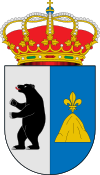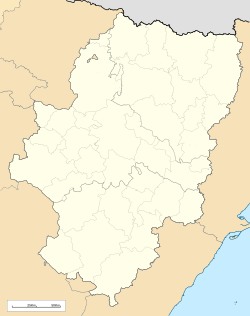Pueyo de Santa Cruz facts for kids
Quick facts for kids
Pueyo de Santa Cruz
|
||
|---|---|---|
|
||
| Country | ||
| Autonomous community | ||
| Province | Huesca | |
| Comarca | Cinca Medio | |
| Area | ||
| • Total | 9 km2 (3 sq mi) | |
| Population
(2018)
|
||
| • Total | 314 | |
| • Density | 34.9/km2 (90/sq mi) | |
| Time zone | UTC+1 (CET) | |
| • Summer (DST) | UTC+2 (CEST) | |
Pueyo de Santa Cruz is a small town in Spain. It is located in the province of Huesca. This area is part of Aragon, which is an autonomous community in Spain.
In 2018, about 314 people lived in Pueyo de Santa Cruz. This makes it a quiet and peaceful place. The town is known for its history and location in the beautiful Spanish countryside.
Contents
Where is Pueyo de Santa Cruz?
Pueyo de Santa Cruz is in northeastern Spain. It is part of the Cinca Medio region. This region is known for its farming and natural beauty. The town is not far from the Cinca River.
The province of Huesca is in the Pyrenees mountains. This means Pueyo de Santa Cruz is surrounded by lovely landscapes. You can find hills, valleys, and open fields nearby.
What is a Municipality?
Pueyo de Santa Cruz is called a "municipality." A municipality is like a local government area. It has its own town council and mayor. They manage local services for the people living there.
These services include things like roads, parks, and public buildings. The people of Pueyo de Santa Cruz elect their leaders. These leaders help the town run smoothly.
History of Pueyo de Santa Cruz
The name "Pueyo" comes from an old word meaning "hill" or "small mountain." "Santa Cruz" means "Holy Cross." This suggests the town might have grown around a church or a cross on a hill.
Like many towns in Spain, Pueyo de Santa Cruz has a long history. It has seen many changes over the centuries. Life here was often connected to farming and the land.
Life in Pueyo de Santa Cruz
Life in Pueyo de Santa Cruz is calm and community-focused. Many people work in agriculture. They grow crops or raise animals. The town has a strong sense of local tradition.
Residents enjoy the quiet pace of life. They are close to nature. The town is a good example of a traditional Spanish village. It shows how people live in rural areas.
See also

- In Spanish: Pueyo de Santa Cruz para niños
 | Janet Taylor Pickett |
 | Synthia Saint James |
 | Howardena Pindell |
 | Faith Ringgold |




